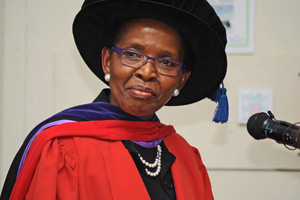Past traumas are a present problem
22 November 2010 Facing memories: Prof Pumla Gobodo-Madikizela tackled trauma - the heart of transformation - in her inaugural lecture. For the pod cast go here and for the video go here.
Facing memories: Prof Pumla Gobodo-Madikizela tackled trauma - the heart of transformation - in her inaugural lecture. For the pod cast go here and for the video go here.
Working through trauma by facing the past is at the heart of transformation, said Professor Pumla Gobodo-Madikizela in her much-anticipated inaugural lecture, titled The 'Face of the Other': Human dialogue at Solms Delta and the meaning of moral imagination, delivered at UCT on 11 November.
This, said Gobodo-Madikizela, is the central theme of her world-renowned work on trauma, empathy and forgiveness in post-apartheid South Africa.
"The questions that I have been dealing with in my work are part of both a personal and a professional journey," said Gobodo-Madikizela, of UCT's Department of Psychology. "My work grew out of the investigation of extreme violence committed in a collective context."
Gobodo-Madikizela argued for a crucial link between violence and trauma.
"Trauma leads to a disruption of the protective aspects of functioning," she said, explaining that severely abused individuals have a tendency to 'cut off' (or dissociate from) painful experiences, to protect themselves from confronting pain.
Unfortunately, traumatised people learn to 'cut off' such painful or stressful experiences by taking them out on others - thereby perpetuating a cycle of violence.
Gobodo-Madikizela describes this process as 'acting out' trauma - the opposite of 'working through' it - and applies this theory not only to individuals, but also to groups.
"When a group has suffered victimisation and its members share humiliating injury, the 'narrative' of this victimisation establishes an imprint in the group's identity, and becomes a theme in the violent 'acting out' this past trauma. These traumatic re-enactments are known to be passed on from one generation to the next, playing out cycles of violence that so often repeat themselves historically.
"Perhaps we can now consider the possible link between the excessive violence of the 'necklace' murders they committed, and their traumatic history."
Gobodo-Madikizela said that past traumas, specifically those experienced collectively, don't simply disappear.
"Suggesting that people must 'forget the past' creates great conceptual mischief," she argued. "Those at the margins wake up daily to face feelings of worthlessness and a yawning void of emptiness in their lives. One cannot bestow a sense of worth on others' lives if one does not know what worthiness means."
But Gobodo-Madikizela points out that her appeal for recognition of the past is not intended to rekindle old hatred, but to transform that past - or, at least, its effects.
"The multiple dimensions of the story of apartheid, a practice that has been called a crime against humanity, and the sheer burden that it imposes at both an unconscious and conscious level, must be confronted."
Gobodo-Madikizela says that the Truth and Reconciliation Commission (of which she was a member) was a starting point in the process, opening a space for the narration of trauma, but the task of reparative healing is yet to happen.
"What is needed is a process of transformative dialogue that goes beyond the binaries of victim-perpetrator," she explains. "Secondly, such dialogue should lead to true transformation of lives, not only transcending the traumatic past, but also breaking the cycles of its transgenerational repetition."
Gobodo-Madikizela's inaugural lecture is one of a three-part series of lectures, Living Reconciliation, co-hosted with the Institute for Justice and Reconciliation.
 This work is licensed under a Creative Commons Attribution-NoDerivatives 4.0 International License.
This work is licensed under a Creative Commons Attribution-NoDerivatives 4.0 International License.
Please view the republishing articles page for more information.








